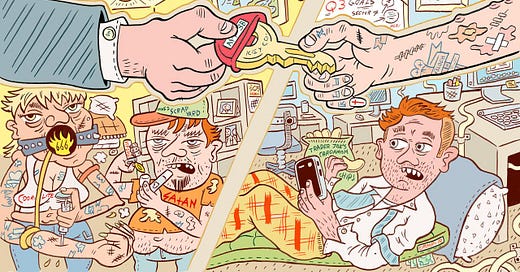Secret Life of an Obsessive Airbnb Host
Determined to quit his tired government job, one D.C. office drone saves $25,000 by renting his apartment nightly and secretly sleeping on the office floor.
I never got used to that camping mat and would often lie awake staring at the ceiling. It didn’t offer much to look at, except the pipes that encased the Internet plumbing for the sixth floor. That morning had been the first time I showered in the men’s locker room without bothering to exercise.
To eat, I stockpiled a cache of Trader Joe’s entrees in the break room — no one noticed that a single pair of initials monopolized the freezer. Every night, my coworkers would remark on my sudden enthusiasm for budget reports and inquire about the midnight oil. It was still burning, I assured them.
Keep reading with a 7-day free trial
Subscribe to Narratively to keep reading this post and get 7 days of free access to the full post archives.




